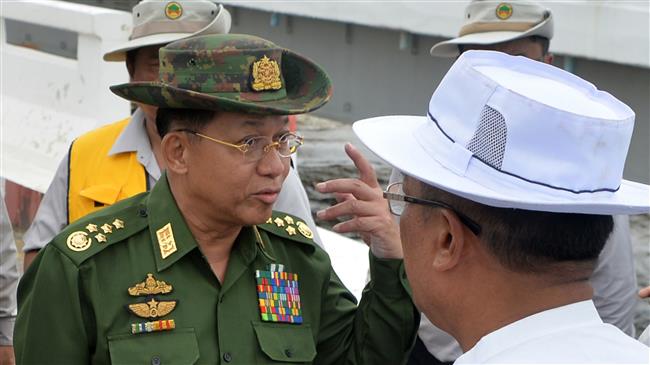Despite mountain of evidence, Myanmar denies genocide


Myanmar has blatantly rejected the findings of a United Nations (UN) investigation that holds the country’s military responsible for committing genocide against its minority Rohingya Muslim population.
“We didn’t allow the FFM (the UN Fact-Finding Mission) to enter into Myanmar; that’s why we don’t agree and accept any resolutions made by the Human Rights Council,” Myanmar’s government spokesman Zaw Htay said on Wednesday.
Reacting to the damning UN report, which called for the prosecution of Myanmar’s top generals for genocide, Zaw Htay pointed to the establishment of the country’s own Independent Commission of Enquiry, which he said had been set up to respond to “false allegations made by the UN agencies and other international communities.”
The Monday report by the UN insisted that there was evidence of genocide and crimes against humanity “perpetrated on a massive scale.”
A UN fact-finding mission reports that the Myanmar military carried out the ‘gravest crimes under international law’ against Rohingya Muslims with ‘genocidal intent.’
Following the release of the report, the UN Security Council held a session late on Tuesday, when countries, including even the United States — which has been largely silent on the atrocities against the Rohingya Muslims — called for Myanmar’s military leaders to face justice.
The UN report marks the first time the world body has explicitly demanded that Myanmarese authorities face genocide charges over a brutal crackdown on Rohingya Muslims.
Thousands of Rohingya Muslims were killed, injured, arbitrarily arrested, or raped by Myanmarese soldiers and Buddhist mobs mainly between November 2016 and August 2017, when many of the surviving members of the community started fleeing to Bangladesh en masse.
In their absence, the government has bulldozed their villages, built new housing structures, and shuttled Buddhist citizens from elsewhere in the country to populate the area.
While some countries, including the US, seek to confine blame to the military, the government in Myanmar, too, has not only failed to act to stop those atrocities but has also thrown its weight behind the military.
The state-sponsored violence forced some 700,000 Rohingya to flee to Bangladesh. Many of the displaced Rohingya are either living in squalid camps or just across the border in a plot of land known as “no man’s land.”
Zaw Htay also said, “Our stance is clear and I want to say sharply that we don’t accept any resolutions conducted by the Human Rights Council.”
He claimed that the country had “zero tolerance to any human rights violation,” adding, “If there is any case against human rights, just give us strong evidence, record, and date so that we can take legal action against those who break the rules and regulations.”
Massive evidence has already been collected by international observers, medics, and journalists, even though the government has blocked access to the ground zero of the violence, namely the Rakhine State.
A study of the scars left on the bodies of Rohingya refugees expelled from Myanmar testifies to their accounts of state-sponsored violence against civilians.
Countless satellite images have also captured the state of the land that was once populated by the Rohingya in Rakhine: burned and flattened to the ground.
Zaw Htay also protested a move by Facebook to shut down the account of Myanmar’s army general, Min Aung Hlaing, and other top military officials.
The social media firm has admitted that it was too slow to react to the brutal violence in Myanmar, which saw its platform become an incubator of hate speech against the Rohingya Muslims.









